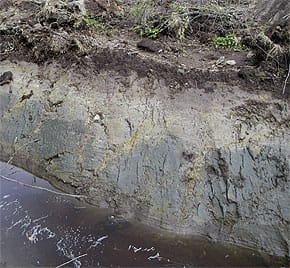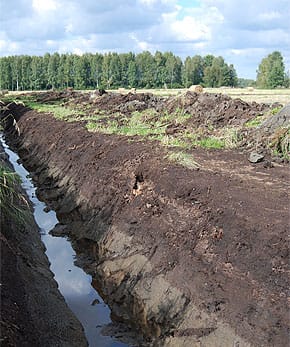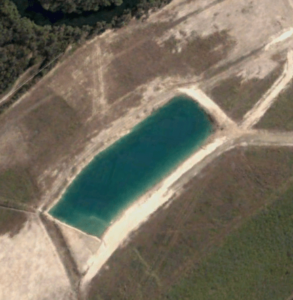Acid Sulphate Soils
What are Acid Sulphate Soils?
Acid Sulphate soils are naturally occurring soils high in sulphur compounds. They can be classified into two categories:
- Potential acid sulphate soils: soil or sediment containing metal sulphides with a potential to be acidic if exposed
- Actual acid sulphate soils: already produced acid from oxidation (exposure to air)

An example of Acid Sulphate Soils

Acid Sulphate Soils – another example.
Why are Acid Sulphate Soils an issue?
When metal sulphides are exposed to air, a chemical reaction occurs which results in the release of sulphuric acid. The exposure of acid sulphate soils is a risk to aquatic ecosystems, habitat, human health, productivity and the built environment, and can result in:
- Degraded soils
- Acidified water-bodies (pH levels similar to battery acid)
- Decreased water dissolved oxygen levels
- Degraded groundwater resources
- Mobilisation of heavy metal contaminants
The exposure of acid sulphate soils to air can lead to:
- Fish kills
- Degraded infrastructure (steel and concrete pipes and structures)
- Plant die-back
- Loss of productivity
How do they develop?
Acid Sulphate Soils need the following conditions to develop:
- Waterlogged and oxygen-free conditions
- A source of sulphate (can be from seawater or saline groundwater)
- The presence of organic matter
- Heavy metals (including iron)
- Exposure to air, which may include being excavated or by lowering of the groundwater table – This is when they become an issue!
Where do Acid Sulphate Soils develop?
Acid Sulphate Soils are often associated with coastal alluvial (riverine) sediments and can also be present in inland estuarine environments. They are especially prevalent in elevations less than 5 m AHD (Australian Height Datum), or when excavating in materials below 20 m AHD
What are some of the signs of Acid Sulphate Soils?
The signs include:
- Iron staining and iron dependent bacteria
- Oil like slicks
- Monosulphidic black oozes
- Vegetation die-back
- Vegetation changes (to acid tolerant species such as from mangrove to melaleuca)
- Ponded water is often clear with a slight blue tinge
What can be done about them?
The best way to deal with Acid Sulphate Soils is to avoid disturbing them. This is best achieved by doing initial investigation prior to design. If that is not possible, then the following hierarchy should be adhered to:
- Minimisation of disturbance
- Neutralisation (usually through the application of agricultural lime)*
- Hydraulic separation of sulphides (usually on dredge material)
- Strategic reburial
*It is important to note that salt water neutralisation is rarely regarded as an acceptable practice for neutralisation.
Are there any relevant guidelines or legislation?
The Queensland State Planning Policy identifies Acid Sulphate Soils as a state interest for water quality:
- In acid affected areas, to protect the natural and built environment (including infrastructure) and human health from the potential adverse impacts of Acid Sulphate Soils
The National Strategy for the Management of Coastal Acid Sulphate Soils includes:
- Avoidance disturbance of coastal Acid Sulphate Soils
Guidelines include:
- Queensland Acid Sulphate Soil Technical Manual: Soil Management Guidelines vol. 4.0 (2014)
How can Simmonds & Bristow help?
- Acid Sulphate Soil Training (for Council Officers, developers, or land use planners)
- Acid Sulphate Soil Investigations and Mapping (to aid design)
- Acid Sulphate Soil Management Plans
- Acid Sulphate Soil Testing and Analysis
- Acid Sulphate Soil Liming Rate Calculations
- Acid Sulphate Soil Lime Verification Testing
Interested in learning more? Stay tuned to this space and to our Training Calendar for upcoming workshops.

Potential Dam impacted by Acid Sulphate Soils as evidenced by clear blue-green colour (Source: Google Earth)




